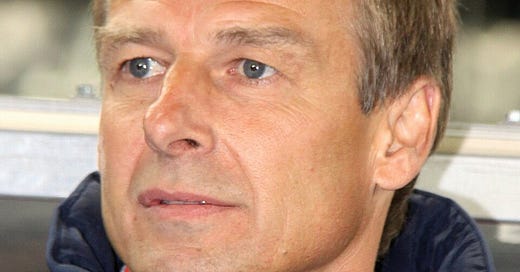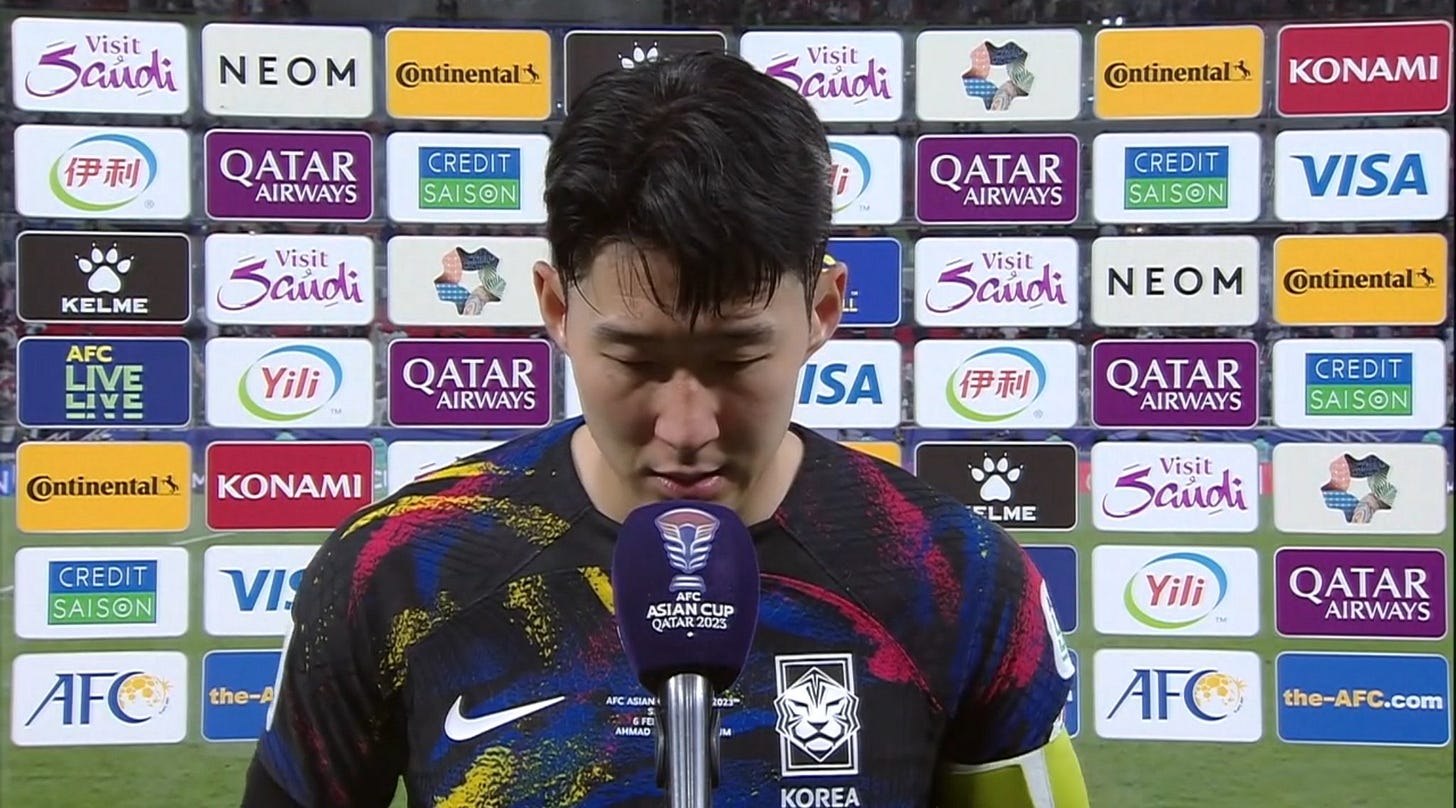5 things that were or weren't Klinsmann's Fault
Jürgen Klinsmann is receiving the bulk of the criticism for South Korea's semi-final exit at the Asian Cup but is it deserved?
South Korea’s 64-year wait for an Asian cup will go on another 4 years at least. Unceremoniously dumped out in the semi-final by Jordan in a 2-0 defeat that was their first ever against the West Asian nation. Their run to the semi-final had been dramatic to say the least with 54% of their goals coming after the 75th minute. It was a run that owed much to the team’s spirit and individual brilliance of some of their star players, but ends one game short of a final. The immediate aftermath of the game has seen a somewhat foreseen barrage of criticism directed towards the 59 year-old who took the job just less than a year ago. Promising to end the long wait for the trophy, but ultimately failing to deliver has led to many to call for his resignation. So, how much can or should the blame be laid at the feet of the former USA and German national coach.
Tactics
The main stick to beat Klinsmann with throughout the tournament. The German coach is probably best described as the ‘motivational’ type manager, worst as a ‘pure vibes’ one, similar to the likes of Ole Gunnar Solskjær or a Marc Wilmots. With Korea’s attacking talent of Son Heung-min, Lee Kang-in and Hwang Hee-chan affording them an element of creative freedom is not in essence a bad thing but as a cohesive attacking unit the Koreans lacked attacking patterns and ways to break down tough opponents. This was shown in the lack of shots on target in most games and reliance on set pieces to score. No shots on target against Jordan in a semi-final would’ve been impossible to imagine pre-tournament. Korea’s main source of attacks during build up throughout the tournament was through the left side and Seol Young-woo. Son Heung-min and even Lee Kang-in would float over to this area and most attacks end with a cross.
Crossing was something that Klinsmann put great emphasis on, something Hwang In-beom explains in his interview with Fifa.com that the coaches would be furious if attacks didn’t end in a cross. Success rates paint a different picture.
In Korea’s 6 game winning streak pre-tournament, which included 6 clean sheets, there wasn’t much talk of a lack of tactics. Klinsmann’s 4-4-2 implemented a high press and counter press effectively at times with Son and Lee Kang-in operating in half spaces; best showcased in their 4-0 friendly victory over Tunisia in October.
Ultimately, in this tournament as soon as Korea conceded a goal against Bahrain in their opener, Klinsmann went away from some of the qualities that had seen them go on that run, which had been preceded by a horrific start, no wins in 5, to his tenure. Chopping and changing his formation, including Son Heung-min’s role in the side, meant that Korea exit the tournament without playing much actual football.
Klinsmann’s fault: Yes, didn’t stick to his convictions even if their were flaws.
Fatigue
Korea played the most minutes of any team in the tournament and squad rotation was poorly managed. A succession of 3 120+ minute games certainly played its part in what looked a very weary side at the end of the 90 against Jordan. The latter stages of the quarter final extra time victory against Australia saw Son Heung-min grabbing for his hamstring, only to be given the lone striker role 4 days later against Jordan. Most unforgivable is the choice of lineup against Malaysia.
In a game that they didn’t need to win - Klinsmann chose his strongest available lineup - the game with injury time added went on for over 120 minutes with Son Heung-min not even subbed off. On top of which a lot of the squad was unused; Lee Soon-min, Kim Ji-soo and Kim Ju-sung never played a minute.
Klinsmann’s fault: Entirely, the most unforgiveable of his errors.
Jordan Semi-Final Defeat
Korea by hook or by crook had made it to the semi-final and faced an opponent who on paper were not a match. This Jordan side, as Korea had already seen in the group stage, were not to be underestimated and executed a game plan that took advantage of Korea’s weaknesses and nullified their strengths. Jordan won the tactical battle completely. Klinsmann chose to implement Son Heung-min at the lone forward instead of the more traditional number 9 of Cho Gue-sung who was dropped to the bench. Son was tasked with running in behind and working incredibly hard, is not only poor load management given Son’s condition at the end of the Australia game, but also culminated in a measly 13 touches in the first half for Korea’s star man. Nil-nil at half-time was fortunate for Korea who had had plenty of warning signs with Jo Hyun-woo in the Korea goal had been busy making 4 saves. Korea had hit the post and perhaps this misled Klinsmann in his half-time team talk. A half-time change had been in order with Korea guilty of losing the ball with poor passes on multiple occasions, Son heavily outnumbered and not in the game. Klinsmann chose to stick and within 10 minutes of the restart another errant pass was capitalised on - an immediate change of Park Yong-woo for Cho Gue-sung signalled it had been on his mind to change things up but it was too late with Jordan similarly taking advantage of an error to double their lead in the 66th minute. This time their would be no dramatic equaliser, nor even a shot on target, forcing extra time.
Hwang In-beom was dribbled past 4 time, Jung Seung-hyun, Kim Min-jae’s replacement due to suspension, twice, Kim Young-gwon had an pass accuracy of 75% in the first half. Even their big stars struggled - Hwang Hee-chan lost possesion 19 times while Lee Kang-in lost it 21 times.
Individually and collectively a very poor performance that can’t just be put down to nerves and fatigue.
Klinsmann’s fault: Partially yes - 80% tactically outclassed and subs were reactionary rather than proactive.
Squad Depth
The fact that members of a 26-man squad did not feature would suggest that the squad depth wasn’t there or wasn’t trusted by the management. Post-World Cup Korea’s talents were as clear as their weaknesses - defence and defensive midfield. If Klinsmann had come in in March 2023, after apparently watching every Korea game at the World Cup as part of Fifa’s technical committee, and said Korea has a lot of talent going forward but there are weaknesses that I aim to address, give me time I’m going to give some young players a chance, then he would be in a much more tenable position. He’s point of naming Son Jun-ho in his first call-up list is a valid one. Korea lack a defensive midfielder; the long-serving Jung Woo-young was dispatched after the World Cup with Son the best option to fill that but his situation in China prevented that potential solution. Korea does lack depth in this position with Hwang In-beom not a viable option, Won Du-jae, Park Jin-seop and Lee Soon-min never given a real chance. Celtic’s Kwon Hyeok-kyu a potential fit but his time in Scotland has been spent adapting to the league and new country, as well as a shift in role away from the DM position in recent performances for St.Mirren on loan. Full back is another area not addressed with the exception of Seol Young-woo, who has probably been Korea’s best player this tournament. Depth in this area not addressed with Kim Tae-hwan (34), Lee Ki-je (32) and Kim Jin-su (31) the other options brought with them to Qatar. I wrote about alternatives and there are many, which weren’t tested out in Klinsmann’s 17 games in charge. Finally, onto centre back and more specifically the partner for Kim Min-jae. Jung Seung-hyun was Klinsmann pick at the start of the tournament, despite not being a regular at K League champions Ulsan HD, before reverting back to veteran Kim Young-gwon. Korea do have young talent in this area that would better suit a style of football that could’ve brought home the trophy. Kim Ji-soo (Brentford) and Lee Han-beom (FC Midtjylland) are both promising centre backs, but who haven’t been playing much. A bolder decision would be to played one of these two than stick with the status quo or end up with a player not playing that regularly either, Jung. England have continued to give Harry Maguire and Kalvin Phillips games despite their lack of club football, while Northern Ireland blooded Conor Bradley before he made his debut for Liverpool. Options were there but not explored. Lastly, Klinsmann’s attitude towards the K League has prohibited his trial and error with a talented group of young players. I don’t believe Klinsmann took the chance to dive deep into the league and look for solutions. His criticism of the league is similar to his critique of the MLS when U.S coach.
Klinsmann’s fault: Partially, not brave enough in team selection but some lack of options in DM.
Smiling and Relationship with the Press
Criticised for smiling during the draw against Malaysia and doubling down with this beam post knockout doesn’t look good and riled up the press who were already gunning for him over the controversy of not spending enough time in Korea. Juxtaposed with the image of a sorrowful Son Heung-min and it looks very bad.








